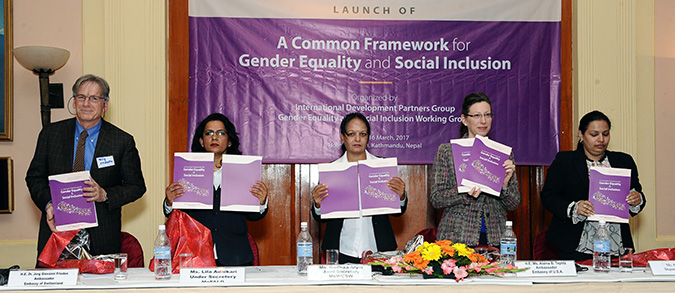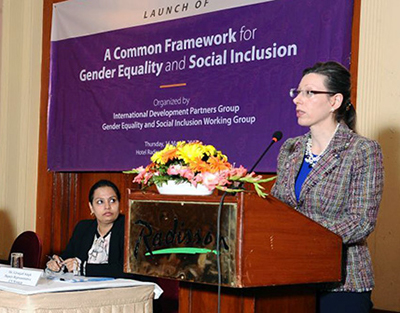The International Development Partner's Group(IDPG) jointly co-chaired by UN Women and USAID launches a common GESI framework
Date:
Author: Monica Upadhyay
With the promulgation of a new constitution that contains many positive provisions to advance gender equality and women's empowerment, as well as due to Nepal's national and international commitments, there has been a significant progress towards achieving gender equality and social inclusion in the country. However, many serious challenges remain and a coherent approach among development partners will ensure more coordinated support to the Government of Nepal.

In response, the International Development Partners Group (IDPG) Gender Equality and Social Inclusion (GESI) Working Group announced the launch of “A Common Framework for Gender Equality and Social Inclusion” at an inauguration event in Kathmandu. The new framework document and approach will help build a common understanding among development partners on gender equality and social inclusion across their programs. This common framework will also improve coordination and harmonization between development partners and lead to more effective support to state and non-state actors in the implementation of the “inclusion” vision embedded in the Constitution of Nepal, and in delivering positive development impacts in a highly diverse Nepali society.

Her Excellency United States Ambassador to Nepal, Alaina B. Teplitz, attended the inaugural event and delivered remarks in support of the Gender Equality and Social Inclusion Framework, lauding it as an important tool to maximize efficiency and effectiveness of development partners, the Government of Nepal, and all other stakeholders in promoting gender equality as a means for more inclusive development initiatives across the country.
His Excellency Ambassador of Switzerland to Nepal, Dr. Jörg Giovanni Frieden said.
UN Women Country Representative, Wenny Kusuma, emphasized, "The framework is based on effective measures being practiced in the country, and that the GESI guidelines, definitions, and tools used by various ministries were reviewed and consultations held with a wide range of government, development partners, and civil society stakeholders." She further explained that while this framework is not prescriptive, it can serve as a common source of guidance while allowing room for legitimate differences in the mandates of different development partners.
For media inquiries, please contact
Monica Upadhyay
Communications Officer;
UN Women Nepal Country Office,
Thapathali Heights;
Mobile: 9841343953